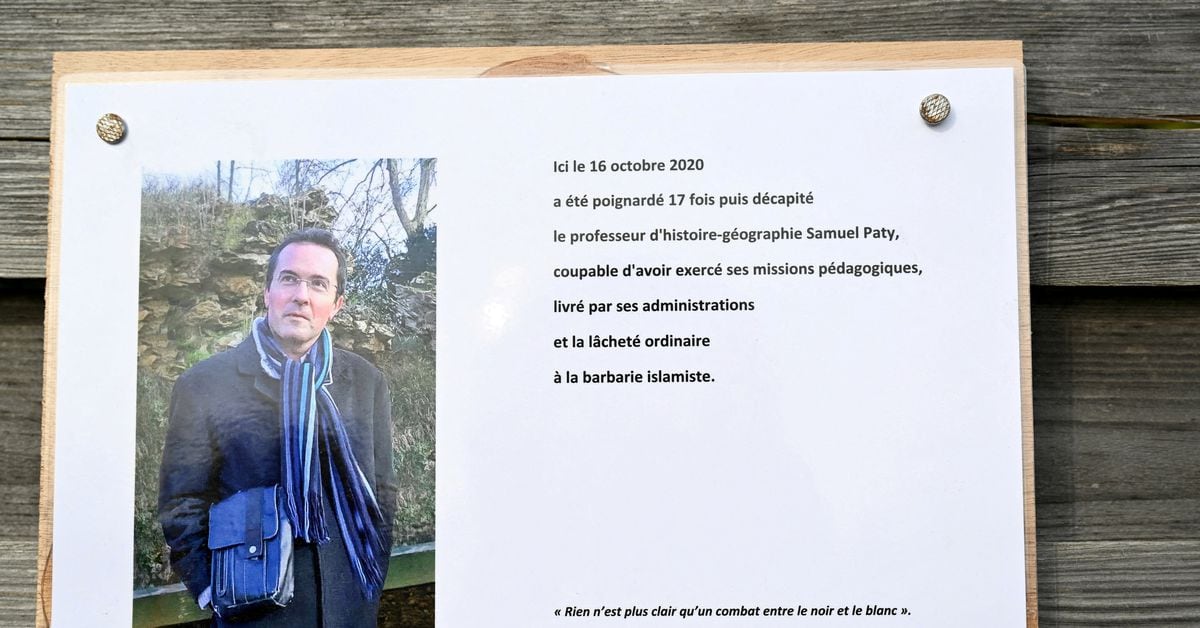PARIS, Nov 27 (Reuters) - Six teenagers go on trial behind closed doors on Monday, accused of involvement in the beheading of French history teacher Samuel Paty by a suspected Islamist in 2020 in an attack that struck at the heart of the country’s secular values.
The teacher had shown his pupils cartoons of the Prophet Mohammad in a class on freedom of expression, angering a number of Muslim parents. Muslims believe that any depiction of the Prophet is blasphemous.



They are not the perpetrators, and were kids at the time. Kids are easily influenced, and make mistakes, a lot of them.
In this case those mistakes ended up causing the gruesome death of an innocent teacher, that is why they are on trial. If someone is guilty, it is their parents, who failed to educate them, and those who exploited those weaknesses to put them under their influence.
Im sorry but my mistakes as a kid were breaking windows not beheading people.
In this case it is more selling information about the victim to the perpetrator.
The tribunal task will be to evaluate if they knew what the perpetrator was about to do, in which case their punishment will be harsher, or if they didn’t.
Again, they didn’t behead anyone
Cool, how long did you go to jail?
And adults aren’t? Tired of this nonsense that people reach a certain age and all of a sudden they can tell right from wrong.
Were you one of those kids who couldn’t tell right from wrong? I wasn’t, and neither were most of my peers. It’s a cultural issue, not an age one.
I mostly agree with you.
It is more of a legal shortcut, but it is a useful one if we don’t want to have to do psychological expertise and possibly counter-expertise for every case to determine if someone is mature enough or isn’t.
I know some man-childs that never got past a teenager maturity, as well as teenagers who have more maturity than many “adults”.
But laws have to be precise for many reasons, and the age of legal responsibility has many reasons to exist other than this case.
Still, adults are mostly less immature than kids, as they had the time to mature (albeit not everyone, unfortunately).
More life experience means it is easier for adults to discern bullshit from truth, and thus their responsibility is considered as full in the case they make mistakes.
A kid tribunal task is as much to discern how mature a kid is as it is to sentence them to a just punishment.
Edit : merging two answers to the same comment.
deleted by creator
Let those of us who weren’t involved in a religiously charged murder cast the first stone.
Wait…
I don’t know for you, but most of us aren’t. Throwing stones at them will only lower us at the same level as those who beheaded others for their fanatical ideology. Let justice do its work.
Na dawg, I’m poking fun at your “look, we all make mistakes” sentiment when we’re talking about fucking murder.
Sorry, simply assisting a murder.
And because you seem confused, this is what it means to cast stones in this context: https://idioms.thefreedictionary.com/cast+the+first+stone
Better believe I’m comfortable casting this particular stone.
I’m not confused, I know this idiom very well.
I was writing from a juridical view point, not from an emotional one. Like everyone I want them to be punished, but in accordance with their fault, not with the emotion, albeit legitimate, that teacher murder created. Once again, they are kids, or maybe should I say teens, with limited life experiences, easily swayed by those who offer them a seemingly strong identity, like every teenager strives to find at that period of their life.
A strong punishment is necessary, but not as strong as if they were full fledged adults.
Usually in France, at that age, sentences are in most cases cut in half of what an adult would get. Exception for life sentences, in which case it is the “surety period”, during which they cannot be released no matter what, which will be cut in half.